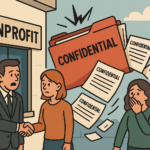When Confidentiality Gets Breached in a Nonprofit

Nonprofits thrive on trust. Donors trust their contributions will be used wisely. Clients trust that their personal stories won’t be shared beyond safe boundaries. Staff and board members trust that sensitive information will be handled with discretion. Break that trust through a confidentiality breach, and the ripple effects can be devastating.
The Immediate Fallout
When confidentiality is breached—whether it’s donor information, client records, board discussions, or staff matters—the first impact is often shock and loss of confidence. Donors may question whether their financial and personal details are safe. Clients may feel exposed or betrayed. Staff may wonder if their leadership can be trusted. What seems like “just one slip” can very quickly escalate into reputational damage.
Legal and Compliance Risks
Many nonprofits handle sensitive data—health information, financial records, employment details. Depending on the type of breach, the organisation may be subject to legal action, regulatory fines, or mandatory reporting requirements under privacy legislation (such as GDPR in Europe or the Privacy Act in Australia). Even if no law is broken, the perception of mishandling data can cause long-lasting harm.
Reputational Damage
Confidentiality breaches erode the very foundation of a nonprofit’s credibility. Once supporters, clients, or partners doubt your ability to safeguard information, it’s hard to win that confidence back. Rebuilding reputation requires time, money, and relentless transparency—resources that could have been invested directly in mission delivery.
Impact on Fundraising
Fundraising is built on relationships. Donors share details about their giving capacity, estate plans, or personal motivations under the assumption that this information will remain private. If that trust is broken, donors are less likely to give again, or they may restrict their giving. Word travels quickly in donor communities—breaches can discourage not just one supporter, but whole networks of philanthropists.
Internal Consequences
Confidentiality isn’t just about external relationships. Staff morale can take a hit when breaches occur, especially if the breach involves gossip, HR matters, or board discussions that were never meant to leave the room. Without trust inside the organisation, teamwork and productivity unravel.
What Nonprofits Should Do if a Breach Occurs
- Act fast: Contain the breach, assess what information was compromised, and stop further exposure
- Notify stakeholders: Be transparent with those affected. Honesty is critical, even when the message is uncomfortable
- Review and report: Investigate what went wrong, report as legally required, and document the incident
- Strengthen policies: Update data protection measures, staff training, and board protocols to prevent repeat mistakes
- Rebuild trust: Demonstrate accountability and reassure stakeholders that lessons have been learned
Prevention Is Always Better
The best defence against confidentiality breaches is a proactive culture of responsibility. That means:
- Regular training for staff and volunteers on data protection and confidentiality
- Clear policies that outline what information is confidential, who has access, and how breaches are reported
- Strong technical safeguards, including secure CRMs, encrypted communications, and role-based access to data
- Reinforcing expectations at board level, where sensitive conversations about strategy, finances, or leadership take place
A confidentiality breach isn’t just an administrative slip—it’s an existential threat to a nonprofit’s reputation, fundraising success, and mission. Nonprofits that take confidentiality seriously not only avoid disaster but also build a culture of trust that strengthens relationships with everyone they serve.
